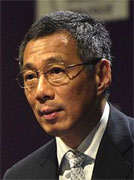Recession-hit Singapore to dip into sovereign wealth funds
21 Jan 2009
 Singapore, the first Asian country to bite recession late last year, could tap the hundreds of billions of dollars held in the country's sovereign wealth funds to tackle the deepening recession to save jobs, help businesses as the economy could contract by 2 per cent in the fifth wealthiest country in the world in terms of GDP.
Singapore, the first Asian country to bite recession late last year, could tap the hundreds of billions of dollars held in the country's sovereign wealth funds to tackle the deepening recession to save jobs, help businesses as the economy could contract by 2 per cent in the fifth wealthiest country in the world in terms of GDP.
Goh Chok Tong, the senior minister and former Prime Minister for 14 years prior to 2004 told the The Business Times in Singapore on Monday, "We've always said the reserves are for a rainy day. If this is not a rainy day, I don't know what is a rainy day."
Singapore's sovereign wealth funds, which is considered to be one of the wealthiest sovereign funds in the world, in the past has invested substantially in global financial institutions and the country may have to dip into these funds considered sacred cows by Singaporeans, to bail out its ailing domestic economy.
With foreign exchange reserves standing at $174.2 billion as of December and its two sovereign wealth funds, Government of Singapore Investment Corporation (GIC) and Temasek Holdings, both having portfolios worth approx 100 billion and $185 billion respectively, although the true figures have never been disclosed, the government has enough financial armory to tackle the financial crisis.
The Singapore government created investment funds has been investing heavily in troubled global financial institutions with GIC investing $16 billion in the troubled Swiss bank UBS and US bank Citigroup while Temasek bought a 9.5 per cent holding in the former US investment bank Merrill Lynch for $4.4 billion and has stakes in regional companies of repute including Singapore Airlines.
Temasek also made a $2 billion investment in the London based bank, Barclays in July 2008 and has been steadily increasing its stake in Standard Chartered Bank over the past two years. Temasek now owns 19.03 per cent of Standard Chartered, which was valued at $8.4 billion in August last year.
Citigroup Global Markets report for 2007 had said that both Temasek and GIC are among the largest sovereign wealth funds in the world but both these funds saw its investments taking a plunge due to the massive losses incurred from US subprime, or higher-risk, mortgage investments.
In September, GIC reported that it managed $100 billion in investments and its rate of return was 7.8 per cent in US dollars over the past 20 years while Temasek reported a record annual profit of $12.25 billion in August 2008 but its assets are not covered by the constitutional amendment on net investment returns.
GIC invests the country's foreign exchange reserves and although it reports that it manages about $100 billion, analysts feel that the sovereign wealth fund manages more than $300 billion and as of March 2008 it cash portfolio was 7 per cent and Temasek's revenue could also be derived from land sales as well as dividends from companies owned by it but these revenues have never been disclosed.
Goh Chok Tong, suggested that the government may dip into the country's sovereign wealth fund for the first time to increase spending in this year's budget to stimulate the economy although it shunned using these funds during the Asian financial crisis in 1999 even when it faced a budget deficit of $5 billion.
Singapore's ministry of trade and industry (MTI) said on Wednesday that the country's gross domestic product (GDP) growth is likely to be between minus 5.0 per cent and 2.0 percent in 2009, which is lower than its 2 January estimate of a contraction of 2.0 per cent to a growth of 1.0 per cent.
The MTI said in a statement that the "Data releases in the past two weeks for retail sales and unemployment in the US, industrial production in Europe, and exports by Asian economies suggest that external demand conditions have weakened to a greater extent than earlier estimated," and added that this will have a major impact on the economy of Singapore, which is trade-dependent.
The electronics purchasing managers' index for Singapore posted a record low in December 2008. The chemicals cluster is expected to weaken with lower oil prices and lower global demand for other manufactured goods. Global trade is expected to contract in 2009, which will affect trade-related sectors such as wholesale and retail trade and transport and storage, said the MTI.
The country recorded its biggest fall in exports in seven years with a 21 per cent overall decline and its non-oil domestic exports slid 7.9 per cent as demand shrunk from key trading partners like Europe and the US as per the official data which was released on Monday.
30 per cent of the cranes were idle at the PSA- Singapore only port, which is the world's largest container transshipment hub, handling about one-fifth of the world's total container transshipment.
Its fixed-asset investment saw a drop by 44 per cent this year as the Economic Development Board forecasts its fixed-asset investment to range between 10 and 12 billion dollars, which is climb down from 18 billion last year.
Last year, nearly 40 per cent of the 131 small businesses that closed were recorded in the last four months and the closures were nearly 25 per cent more than 2007 figures.
The finance minister, Tharman Shanmugaratnam is scheduled to announce the country's budget on Thursday, which is expected to make a deficit and the government will be forced to make a sizable fiscal stimulus, which will focus on boosting the country's economy in the short term with tax rebates, training and spending on infrastructure projects, according to some analysts.




















